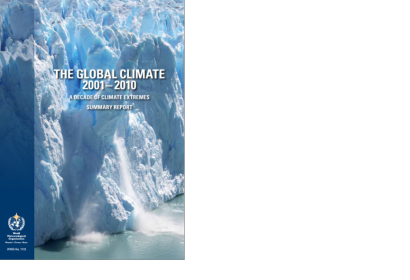The World Meteorological Organization published the report "2001-2010, A Decade of Climate Extremes". The world experienced unprecedented high-impact climate extremes during the 2001-2010 decade, which was the warmest since the start of modern measurements in 1850 and continued an extended period of pronounced global warming. More national temperature records were reported broken than in any previous decade, according to the report.
The report analysed global and regional temperatures and precipitation, as well as extreme events such as the heat waves in Europe and Russia, Hurricane Katrina in the United States of America, Tropical Cyclone Nargis in Myanmar, droughts in the Amazon Basin, Australia and East Africa and floods in Pakistan.
The decade was the warmest for both hemispheres and for both land and ocean surface temperatures. The record warmth was accompanied by a rapid decline in Arctic sea ice, and accelerating loss of net mass from the Greenland and Antarctic ice sheets and from the world’s glaciers. As a result of this widespread melting and the thermal expansion of sea water, global mean sea levels rose about 3 millimetres (mm) per year, about double the observed 20th century trend of 1.6 mm per year. Global sea level averaged over the decade was about 20 cm higher than that of 1880, according to the report.
The 100-page report and an executive summary, incorporating findings from a unique survey of 139 National Meteorological and Hydrological Services and socio-economic data and analysis from several UN agencies and partners, were released to coincide with the first session of the Intergovernmental Board on Climate Services. This Board is overseeing the implementation of the Global Framework for Climate Services – an international initiative to improve and expand scientifically-based climate information to help society cope with the natural variability of our climate and human induced climate change.
‘“A decadal perspective makes it possible to assess trends in the climate system and anticipate the future. It can also inform efforts to develop operational climate services that provide information and forecasts for decision-making in agriculture, health, disaster risk, water resources and other sectors. These efforts are being coordinated through the WMO-led Global Framework for Climate Services,” said WMO Secretary-General Michel Jarraud.

